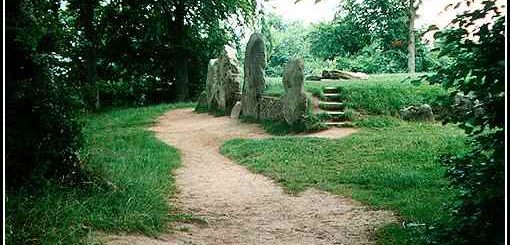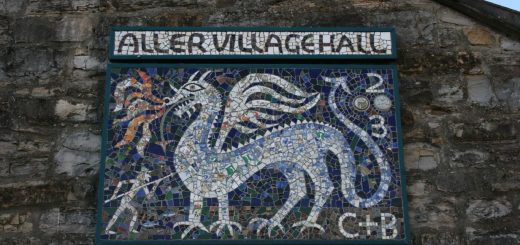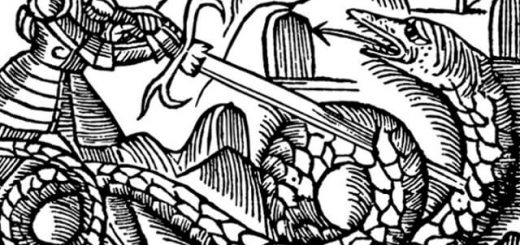The Grave of Gelert
‘In the 13th century Llywelyn, prince of North Wales, had a palace at Beddgelert. One day he went hunting without Gelert, “The Faithful Hound”, who was unaccountably absent. On Llywelyn’s return the truant, stained and smeared with blood, joyfully sprang to meet his master. The prince alarmed hastened to find his son, and saw the infant’s cot empty, the bedclothes and floor covered with blood. The frantic father plunged his sword into the hounds side, thinking it had killed his heir. The dog’s dying yell was answered by a child’s cry. Llywelyn searched and discovered his boy unharmed, but near by lay the body of a mighty wolf which Gelert had slain. The prince filled with remorse is said never to have smiled again. He buried Gelert here. The spot is called BEDDGELERT’
 And so the story is of Gelert is told on the grave just outside the village of Beddgelert. The grave has the tale displayed on two stones, one in English and one in Welsh. The grave however does not date from the time of Llywelyn and was built around the turn of the nineteenth century. David Pritchard was the first landlord of the The Royal Goat Hotel in Beddgelert circa 1801 and the grave is attributed to him and several other villagers keen on creating an attraction to draw tourists to Beddgelert and thus line their pockets.
And so the story is of Gelert is told on the grave just outside the village of Beddgelert. The grave has the tale displayed on two stones, one in English and one in Welsh. The grave however does not date from the time of Llywelyn and was built around the turn of the nineteenth century. David Pritchard was the first landlord of the The Royal Goat Hotel in Beddgelert circa 1801 and the grave is attributed to him and several other villagers keen on creating an attraction to draw tourists to Beddgelert and thus line their pockets.
The tale of Gelert was immortalised further by the Hon W R Spencer (1769-1834), in his poem:
‘Beth-Gelert’
The spearman heard the bugle sound,
And cheerily smiled the morn;
And many a brach, and many a hound,
Obeyed Llewellyn’s horn.
And still he blew a louder blast,
And gave a louder cheer:
“Come, Gelert, come, why are thou last
Llewellyn’s horn to hear!
“Oh, where does faithful Gelert roam?
The flower of all his race!
So true, so brave — a lamb at home,
A lion in the chase!”
‘Twas only at Llewellyn’s board
The faithful Gelert fed;
He watched, he served, he cheered his lord,
And sentinel’d his bed.
 In sooth he was a peerless hound,
In sooth he was a peerless hound,
The gift of Royal John –
But now no Gelert could be found,
And all the chase rode on.
And now as over rocks and dells
The gallant chidings rise,
All Snowdon’s craggy chaos yells
With many mingled cries.
That day Llewellyn little loved
The chase of hart or hare;
And scant and small the booty proved,
For Gelert was not there.
Unpleased Llewellyn homeward hied,
When, near the portal-seat,
His truant, Gelert, he espied,
Bounding his lord to greet.
But when he gained the castle-door,
Aghast the chieftain stood;
The hound all o’er was smeared with gore —
His lips, his fangs ran blood!
Llewellyn gazed with fierce surprise,
Unused such looks to meet,
His favourite checked his joyful guise,
And crouched and licked his feet.
Onward in haste Llewellyn passed —
And on went Gelert too —
And still, where’er his eyes were cast,
Fresh blood-gouts shocked his view!
O’erturned his infant’s bed he found,
The bloodstained covert rent,
And all around, the walls and ground,
With recent blood besprent.
He called his child — no voice replied;
He searched — with terror wild;
Blood! blood! he found on every side,
But nowhere found the child!
“Hell-hound! my child’s by thee devoured!”
The frantic father cried;
And, to the hilt, his vengeful sword
He plunged in Gelert’s side!
His suppliant looks, as prone he fell,
No pity could impart;
But still his Gelert’s dying yell,
Passed heavy o’er his heart.
Aroused by Gelert’s dying yell,
Some slumberer wakened nigh:
What words the parent’s joy can tell,
To hear his infant cry?
Concealed beneath a tumbled heap,
His hurried search had missed,
All glowing from his rosy sleep
The cherub-boy he kissed.
Nor scathe had he, nor harm, nor dread —
But the same couch beneath
Lay a gaunt wolf, all torn and dead —
Tremendous still in death!
Ah! what was then Llewellyn’s pain,
For now the truth was clear;
The gallant hound the wolf had slain,
To save Llewellyn’s heir.
Vain, vain was all Llewellyn’s woe;
“Best of thy kind, adieu!
The frantic deed which laid thee low
This heart shall ever rue!”
And now a gallant tomb they raise,
With costly sculpture decked;
And marbles, storied with his praise,
Poor Gelert’s bones protect.
Here never could the spearman pass,
Or forester, unmoved;
Here oft the tear-besprinkled grass
Llewellyn’s sorrow proved.
And here he hung his horn and spear,
And there, as evening fell,
In fancy’s ear he oft would hear
Poor Gelert’s dying yell.
It was first printed in a private broadsheet circa 1800 and then in a collection of Spencer’s poems in 1811. He stated that “The story of this ballad is traditionary in a village at the foot of Snowdon where Llewellyn the Great had a house. The Greyhound named Gelert was given him by his father-in-law, King John, in the year 1205, and the place to this day is called Beth-Gelert, or the grave of Gelert.” One source I found speculated that David Pritchard himself may have passed the story onto Spencer.




Re: The Grave of Gelert
I grew up with this poem, haven’t seen it in years!
Re: The Grave of Gelert
Take the steam train from Porthmadog – Caernarvon but stop off at Beddlegert like we did, we didnt proceed north but heard the rise through the mountains is well worth the trip
The Aberglaslyn pass is very nice too
Re: The Grave of Gelert
The following version of the folktale appeared in ‘The Welsh Fairy Book’ (1908) by W. Jenkyn Thomas
PRINCE LLYWELYN had a favourite, greyhound named Gelert that had been given him by his father-in-law, King John of England. He was as gentle as a lamb at home, but a lion in the chase, so true and so brave that he had no equal in the whole of his master’s dominion. He fed only at Llywelyn’s board and sentinelled Llywelyn’s bed.
One fine morning the Prince determined to go to the chase, and blew his horn in front of the castle. All his other hounds came to the call, but Gelert did not answer it. He blew a louder blast on his horn and shouted, "Come, Gelert, come," saying to his huntsman that it was strange that Gelert should be the last to hear his horn. But still the greyhound did not come, and the chase had to ride on without him.
Llywelyn enjoyed the chase of hart and hare through the vales of Snowdon but little that day, and the booty proved scant and small because Gelert was not there. Disappointed and displeased he turned back to his castle, and as he came to the gate whom should he see but Gelert bounding out to greet him. When the hound came near him the Prince was startled to see that he was smeared all over with gore, and that his lips and fangs were dripping with blood. Llywelyn gazed at him with fierce surprise, and the greyhound crouched and licked his feet, as if surprised or afraid at the way his master received his greeting.
Now, Llywelyn had a little son about two years old with whom Gelert used to play, and the thought that the hound seemed guilty of something or other made him hurry towards the child’s nursery, Gelert following at his heels. Entering, he saw the floor and walls besprent with recent blood, and, worst of all, the child’s cradle was overturned; the coverlet was torn and all was daubed with blood. Llywelyn called his son, but no voice replied: he searched for him, wild with terror, but nowhere could he find him. He jumped to the conclusion that Gelert had destroyed his boy, and shouting, "Hell-hound, thou hast devoured my child," the frantic father drew his sword and plunged it to the hilt in the greyhound’s side, who fell with a deep groan, gazing piteously in his master’s eyes. Gelert’s dying groan was answered by a little child’s cry from beneath the overturned cradle. There concealed beneath a tumbled heap which he had missed in his hurried search, Llywelyn found his little son unharmed and glowing from his rosy sleep. Just beside him lay the body of a great, gaunt wolf, all torn to pieces and stiff in death. Too late, Llywelyn realised what had happened while he was at the chase: Gelert had fought and slain the wolf which had come to destroy Llywelyn’s heir.
In vain was all Llywelyn’s grief: he could not bring his faithful hound to life again. So he buried him and raised a noble tomb over his bones, repenting his rashness with many tears. He could never bear the thought of the chase after this, and hung his horn and hunting spear at Gelert’s grave. To this day the place is called Bedd Gelert, or the Grave of Gelert, and if you go there you will be shown the spot where the remains of the martyred hound lie.